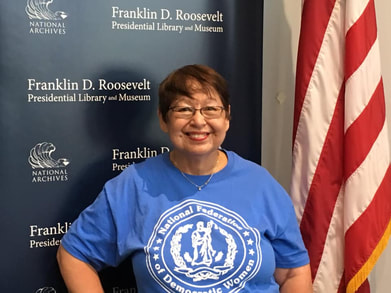 National Federation of Democratic Women President Cindy Jenks National Federation of Democratic Women President Cindy Jenks By Cindy Jenks President National Federation of Democratic Women Stunned, and extremely saddened, we have learned of the passing of Supreme Court Justice Ruth Bader Ginsburg. She has been fighting for all of us for so long that a world without her just doesn’t seem possible. Ginsburg began her professional career as an attorney at the American Civil Liberties Union and she successfully argued several cases before the Supreme Court. During this time, she made gender equality her priority. One of her first cases was representing a man who was being discriminated against because of his gender. Justice Ginsburg is without a doubt one of the most important justices to ever serve on the Supreme Court. She was first appointed to the Court of Appeals for the D.C. District by President Jimmy Carter. President Bill Clinton appointed her to the Supreme Court in 1993, and she faced a daunting interview by three conservative senators, who then voted against her. When one asked her about Roe v. Wade, Ginsburg said, “This is something central to a woman’s life, to her dignity. "It’s a decision that she must make for herself. And when government controls that decision for her, she’s being treated as less than a fully adult human responsible for her own choices." Interestingly, Ginsburg found her voice when writing her dissenting opinions. When the Supreme Court ruled against Lilly Ledbetter, Ginsburg wrote the dissent. When President Obama signed the Lilly Ledbetter, Fair Pay Act into law, he autographed a copy of the bill and presented it to Justice Ginsburg. She framed the bill and kept it in her office. One of Justice Ginsburg’s most famous opinions was written in 1996 when she wrote for the majority in U.S. v. Virginia. The Virginia Military Institute’s 157-year tradition of admitting only males to the institution came to an end when Ginsburg wrote that the practice was unconstitutional. She is also quoted as saying that if she could add anything to the U.S. Constitution it would be the Equal Rights Amendment. Justice Ginsburg was a trailblazer and a monumental jurist that will likely never be matched in comparison to her work ethic, her wit and her dedication to fairness and justice for all persons. She will be missed.
3 Comments
 State Sen. Mary Daugherty Abrams State Sen. Mary Daugherty Abrams By Senator Mary Abrams. On Sept. 10, Connecticut reported 222 newly discovered infections of COVID-19. With those 222 new cases found amid 16,602 tests administered, the state saw a positive test ratio of 1.3 percent. Connecticut Approved For Two Additional Weeks Of Employment Assistance. The Department of Labor announced the state received approval for an additional two weeks of Lost Wages Assistance supplemental funds, the federal program recently put in place to provide an additional $300 per week to anyone with a weekly benefit of at least $100 and who has become unemployed or partially employed due to COVID-19. While the program will only be in place for five weeks, meaning its benefits will be temporary, it will provide additional support to those in need. Anyone who has already received or claimed existing pandemic unemployment assistance do not need to do anything to receive the additional benefit; those wanting to self-certify can log into their unemployment accounts, where they’ll have a new option to “certify for lost wages assistance.” Claimants are expected to receive between three and four total payments, with the first payment of $300 coming mid-September and the remainder following. Roughly 250,000 claimants in Connecticut may be eligible for the funding. FEMA Extends Approval of Non-Congregate Sheltering Program through Oct. 1. The Federal Emergency Management Agency (FEMA) has approved a 30-day extension of the non-congregate sheltering authorization under the FEMA Public Assistance program through Oct. 1. This program provides non-congregate housing to certain high-risk individuals, including those who have COVID-19 or have been in contact with individuals who have the virus. The program covers non-congregate housing for people who are at high risk of exposure in public service, individuals in at-risk facilities, such as group homes, nursing homes, long-term care sites, and alternative care facilities, first responders and health care workers who have been exposed and cannot return home, homeless individuals in congregate shelters, and individuals in domestic violence shelters. Additional SNAP Benefits. The Connecticut Department of Social Services provided over $16.5 million in Emergency Supplemental Nutrition Assistance (SNAP) benefits to nearly half of Connecticut’s SNAP participants on Thursday. Authorized by the federal Families First Coronavirus Response Act of 2020, the extra food benefits will go to nearly 109,600 households that are not currently receiving the maximum benefits allowed for their household size. This means that all households enrolled in SNAP will receive the maximum food benefit allowable for their household size, even if they are not usually eligible for the maximum benefit. The average emergency benefit amount a household will see in its electronic benefits transfer (EBT) card on September 17 is $153. All participating households also received their normal SNAP benefits on the first three days of each month as they normally do. For more information about SNAP benefits, you can click here. Contact MeIf you have any questions or concerns please contact my office at [email protected]. |
GuestBlogGuest blogs written by members of the Cheshire Democratic Town Committee, local Democratic candidates, local, state, national Democrats. Archives
October 2020
Categories |
 RSS Feed
RSS Feed